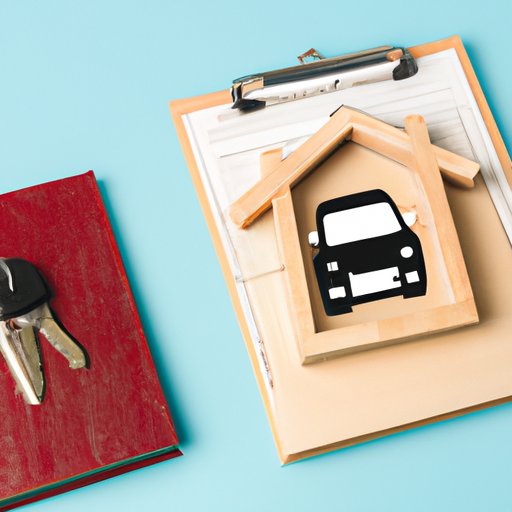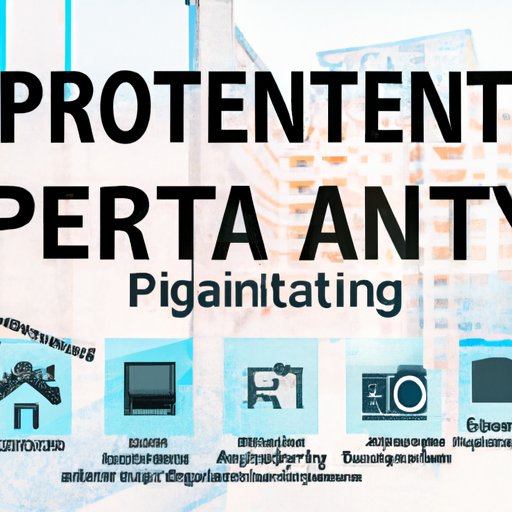
Introduction
A rental property business involves buying or acquiring properties with the aim of renting them out to tenants. It is an excellent way to create a passive income stream. Rental properties provide a steady stream of income, and the business can be an excellent source of long-term wealth creation. In this article, we will provide a comprehensive guide to starting a rental property business. We will cover everything from planning, financing, contracting, marketing, and running your rental property business.
5 Essential Steps to Starting Your Own Rental Property Business
Before you dive into the rental property business, you need to have a proper plan in place. Here are five essential steps that you need to follow before you start your rental property business:
1. Identifying Investment Goals
Start by identifying what you want to achieve with your rental property business. It could be a primary source of income, a long-term investment, or a way to build wealth. Once you have identified your goals, you can tailor your rental property business plan to meet them.
2. Researching the Market and Competitors
Research is essential before venturing into the rental property business. Analyze the current market to identify any trends and establish the competition. Knowing what other landlords are doing will help you differentiate your properties in the market.
3. Choosing the Right Location
Location is critical in the rental property business. Focus on properties in growing areas with a high demand for rental properties. It is also essential to consider proximity to social amenities such as schools, shopping malls, and hospitals.
4. Setting a Realistic Budget
Starting a rental property business requires a significant upfront investment. It would help if you worked on establishing a realistic budget that factors in all aspects, such as property purchase, mortgage payments, and maintenance costs. Set aside enough money for unforeseen expenses as well.
5. Creating a Business Plan
A business plan is a useful tool in managing and growing your rental property business. It should encompass everything from goal-setting, market analysis, financing options, and growth strategies. A well-crafted business plan will help you measure your progress, adjust as necessary, and ensure that you meet your investment goals.
How to Secure Financing for Your New Rental Business
Once you have a solid plan in place, the next step is to secure financing for your rental property business. Here are some options to consider:
1. Options for Financing
There are several financing options available to individuals starting a rental property business. Some options include traditional business loans, property equity loans, and private lenders. Choose the financing option that works best for your needs.
2. Understanding Mortgage Loans and Interest Rates
Understanding the different types of mortgage loans and interest rates is crucial in starting a rental property business. Take the time to research and evaluate all available options. Consult a financial expert to help you understand the various mortgage loan options available.
3. Improving Your Credit Score
A good credit score is essential in securing financing for a rental property business. A good credit score not only increases the chances of your loan approval, but it also secures a favorable interest rate.
4. Using Crowdfunding
Crowdfunding is another option you can consider when kick-starting a rental property business. There are several crowdfunding platforms available that you can use to raise capital for your rental property business.
Maximizing Your Profits: Tips for Selecting the Right Rental Properties
Choosing the right rental property is crucial to the success of your rental property business. Here are some tips to help you select the right rental property:
1. Assessing Market Rates and Property Values
Analyzing the market rates and property values will help you determine the rental income potential of a property. Interest rates, market trends, and demand all play a role in determining a property’s value and rental prices.
2. Considering Location, Amenities, and Neighborhood
The location, amenities, and neighborhood of a property play a significant role in attracting tenants. Consider properties in safe, well-maintained neighborhoods with ample access to social amenities such as schools, hospitals, and shopping centers.
3. Understanding the Needs of Potential Tenants
Identifying your target audience and their needs is essential in selecting the right rental property. Depending on your target audience, you may need to focus on properties with tenants’ specific needs, such as ample storage or pet-friendly locations.
4. Conducting a Property Inspection Before Purchase
A property inspection is essential in identifying any potential issues that may dig into your profits. Do not shy away from hiring a professional inspector who can highlight any underlying issues that may become expensive in the long run.
Navigating the Legal Aspects of Rental Properties: What You Need to Know
The rental property business is highly regulated, and it is vital to understand the legal aspects before starting the business. Here are some critical legal aspects to understand:
1. Obtaining Proper Licenses and Permits
Before commencing the rental property business, ensure that you have all the necessary licenses and permits to operate legally in your area. Familiarize yourself with the local authorities’ regulations and follow them to avoid legal issues.
2. Familiarizing Yourself with Local Laws and Regulations
Every state has its specific landlord-tenant laws, and it is vital to understand them before starting a rental property business. Knowing your rights and responsibilities as a landlord will help you avoid legal issues.
3. Creating Rental Agreements and Contracts
Rental agreements and contracts protect both the landlord and tenant. Ensure that you create a comprehensive rental agreement that covers all the necessary aspects of living in your rental property.
4. Understanding Tenant Rights and Landlord Responsibilities
As a landlord, it is crucial to understand your tenants’ rights and your responsibilities towards them. Familiarize yourself with local, state and national legislation governing tenants’ rights to avoid any legal issues.

Building a Successful Rental Property Business: Strategies for Marketing Your Properties
Once you have your rental properties ready, the next step is to market them and attract tenants. Here are some strategies you can use:
1. Creating a Professional and Appealing Online Presence
Having a professional website and social media presence can help you attract potential tenants. Ensure that your website is easy to navigate, and the social media pages are active with updated information on available rental properties.
2. Networking with Potential Renters and Industry Professionals
Networking is an excellent way to build relationships with potential tenants and industry professionals. Attend local events and conferences to establish these connections. You can also network with tenants who have shown interest in your properties.
3. Using Social Media to Market Your Properties
Social media is a cost-effective way of reaching your target audience. Use social media platforms such as Twitter, Facebook, and Instagram to market your properties and reach potential tenants.
4. Hosting Open Houses and Property Showings
Open houses and property showings provide an opportunity for potential tenants to view your properties and ask questions. Ensure that your properties are clean and well-maintained during these events and offer attractive incentives to potential tenants, such as rental discounts.
Streamlining Your Processes: Time-Saving Tools for Rental Property Management
Managing a rental property business can be time-consuming, but there are several tools and strategies to streamline your processes. Here are some tools you can use:
1. Utilizing Property Management Software
Property management software can help you automate several processes, such as rent payments, maintenance requests, and scheduling property inspections. Explore different options available in the market to find the best software that fits your needs.
2. Hiring a Property Management Company
If you have several rental properties, hiring a property management company can help you relieve some of the workload. Property management companies handle everything from finding tenants, rent collection, and maintaining the property.
3. Automating Rent Payments and Maintenance Requests
Automating rent payments and maintenance requests can free up time and resources that would have been used handling these tasks. There are several tools available that can help you automate these processes.
4. Outsourcing Tasks Like Accounting and Legal Paperwork
Outsourcing tasks such as accounting and legal paperwork can help you save time and resources. Consider hiring a professional, such as an accountant or a lawyer, to handle these tasks for you.
Avoiding Common Pitfalls: Mistakes to Watch for When Starting Your Rental Business
Starting a rental property business is not without challenges. Here are some common pitfalls to watch for:
1. Overextending Financial Resources
It is essential to stick to a reasonable budget when starting a rental property business. Overextending your finances can lead to debt and financial instability.
2. Failing to Properly Screen Tenants
Failing to screen tenants can lead to potential legal issues, late or missed rent payments, and property damage. This can lead to increased costs and a reduction in profits.
3. Neglecting Maintenance and Repairs
Neglecting routine maintenance and repairs can lead to significant property issues, such as pest infestation and structural damage, which can lead to increased costs and decreased property values.
4. Not Understanding the Landlord-Tenant Relationship
Understanding the landlord-tenant relationship is critical in the rental property business. Not knowing your legal responsibilities as a landlord can cause legal issues that can lead to financial and reputational damage.
Conclusion
Starting a rental property business can be a lucrative venture if done correctly. We have covered the essential steps to starting a rental property business, from creating a business plan to marketing your properties and managing them effectively. Take the time to assess your goals, research your market, and create a solid plan. Avoid common pitfalls, and ensure that you adhere to legal requirements. With dedication, patience, and consistency, your rental property business can provide long-term wealth creation.




